Remarks
by Bill Nye

The following correspondence is now given to the press for the first time, with the consent of the parties:
Wm. Nye, Esq.–Dear Sir-I am a young man, 20 years of age, with fair education and a strong desire to succeed. I have done some writing for the press, having written up a very nice article on progressive euchre, which was a great success and published in our home paper, But it was not copied so much in other papers as I would like to have saw it, and I take my pen in hand at this time to write and ask you what there is in the article enclosed that prevents its being copied abroad all over our broad land. I write just as I hope you would feel perfectly free to write me at any time. I think that writers ought to aid each other. Yours with kind regards,
Algernon L. Tewey.
P.O. Box 202.
I have carefully read and pondered over the dissertation on progressive euchre which you send me, Algernon, and I cannot see why it should not be ravenously seized and copied by the press of the broad, wide land referred to in your letters. If you have time, perhaps it would be well enough to go to the leading journalists of our country and ask them what they mean by it. You might write till your vertebrae fell out of your clothes on the floor, and it would not do half so much good as a personal conference with the editors of America. First prepare your article, then go personally to the editors of the country and call them one by one out into the hall, in a current of cold air, and explain the article to them. In that way you will form pleasant acquaintances and get solid with our leading journalists. You have no idea, Algernon, how lonely and desolate the life of a practical journalist is. Your fresh young face and your fresh young ways, and your charming grammatical improvisations, would delight an editor who has nothing to do from year to year but attend to his business.
Do not try to win the editors of America by writing poems beginning:
Now the merry goatlet jumps, And the trifling yaller dog, With the tin can madly humps Like an acrobatic frog.
At times you will be tempted to write such stuff as this, and mark it with a large blue pencil and send it to the papers of the country, but that is not a good way to do.
Seriously, Algernon, I would suggest that you make a bold dash for success by writing things that other people are not writing, thinking things that other people are not thinking, and saying things that other people are not saying. You will say that this advice is easier to give than to take, and I agree with you. But the tendency of the age is to wear the same style of collar and coat and hat that every other man wears, and to talk and write like other men; and to be frank with you, Algernon, I think it is an infernal shame. If you will look carefully about you, you will see that the preacher, who is talking mostly to dusty pew cushions, is also the preacher who is thinking the thoughts of other men. He is “up-ending” his barrel of sermons annually, and they were made in the first place from the sermons of a man who also “up-ended” his barrel annually. Go where the preacher is talking to full houses, and you will discover that his sermons are full of humanity and originality. They are not written in a library by a man with interchangeable ideas, an automatic cog-wheel thinker, but they are prepared by a man who earnestly and honestly studies the great, aching heart of humanity, and full of sincerity, originality and old-fashioned Christianity, appeals to your better impulses.
How is it with our poetry? As a fellow-traveler and sea-sick tourist across life’s tempestuous tide, I ask you, Algernon, who is writing the poetry that will live? Is it the man who is sawing out and sandpapering stanzas of the same general dimensions as some other poet, in which he bewails the fact that he loved a tall, well-behaved, accomplished girl, sixteen hands high, who did not require his love?
Ah, no! He is not the poet whose terra cotta statue will stand in the cemetery, wearing a laurel wreath and a lumpy brow. Show me the poet who is intimate with nature and who studies the little joys and sorrows of the poor; who smells the clover and writes about live, healthy people with ideas and appetites. He is my poet.
I apologize for speaking so earnestly, Algernon, but I saw by your letter that you felt kindly toward me, and rather invited an expression of opinion on my part. So I have written more freely, perhaps, than I otherwise would. We are both writers. Measurably so, at least. You write on progressive euchre, and I write on anything that I can get hold of. So let us agree here and promise each other that, whatever we do, we will not think through the thinker of another man.
The Great Ruler of the universe has made and placed upon the earth a good many millions of men, but He never made any two of them exactly alike. We may differ from every one of the countless millions who have preceded us, and still be safe. Even you and I, Algernon, may agree in many matters, and yet be very dissimilar. At least I hope so, and I presume you do also.
 Continue...
Continue...![[Buy at Amazon]](../images.amazon.com/images/P/B000875S1G.01.MZZZZZZZ.gif)